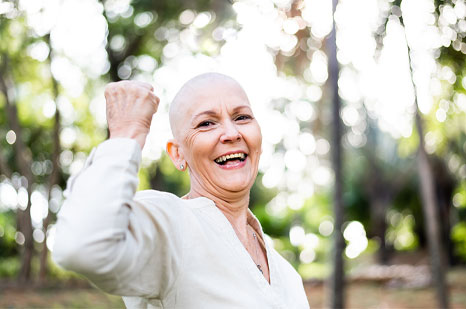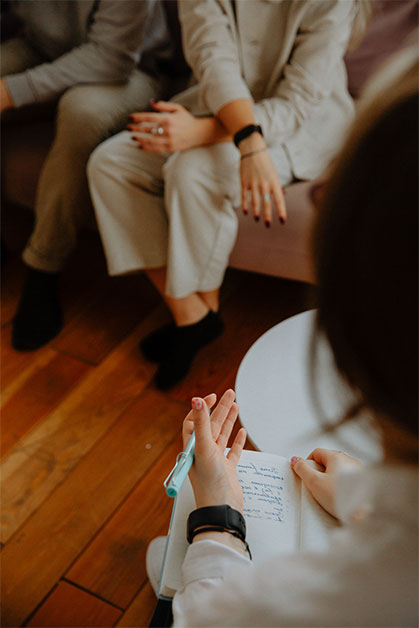How One Pancreatic Cancer Survivor Turned to Positive Thinking to Aid Her Healing
By Staff Writer
It’s no secret that a pancreatic cancer diagnosis can come as quite a shock. Pancreatic cancer survival outcomes have notably worse prognoses than other cancers. As stage IV pancreatic cancer survivor Donna Robinson put it, it’s hard not to think, Oh, I’m a dead person walking. But what if you could reframe those negative thoughts into positive ones? Does the power of reframing actually help with healing?

For Donna, the answer is a resounding yes.
Donna was diagnosed with pancreatic cancer in August 2014, with what she says her medical team called “one of the largest tumors they’d ever seen.” They told her it was incurable, inoperable, and that she had three months to live.
“My first thought was it’s not the cancer that will kill you, it’s the fear of the cancer,” she said.
She thought about what she had learned in prior years about the power of positive thinking and how that thinking could impact your body.
“Every single day, hundreds of times a day, I would say to myself, ‘You have nothing to worry about. Everything is going to be fine. You’re going to be fine.’”
If there was ever a time to enforce that frame of mind, she knew it was now. In the beginning, it was hard for her to believe. But the more she told herself she would be fine, the more she started to believe it.
One message she took to heart was removing as many stressors from her life as possible.
Within the research community, there is a known link between positive thinking and health outcomes. The theory is that this way of thinking—through coping skills and stress management—reduces the harmful effects of stress, like inflammation, which can impact disease progression.
In fact, research out of Sylvester Comprehensive Cancer Center, part of the University of Miami Miller School of Medicine, shows that prostate cancer survivors who used cognitive behavioral therapy skills and relaxation techniques saw not only an improvement in their quality of life, but also an alleviation of stress-related biological changes.
According to Sara Fleszar-Pavlović, Ph.D., a postdoctoral fellow in the South Florida Cancer Control Training in Disparities and Equity program at Sylvester, this study created a model to study other cancer populations. Currently, Miller School researchers are in the data collection phase for a quality-of-life program for pancreatic cancer survivors. The program seeks to meet the needs of this particular population through stress management techniques, coping skills, and relaxation training.
Pancreatic cancer survivors will provide critical input based on their own experience with cancer survivorship, to ensure that participants’ needs are met and supported by as many resourcing tools as possible.
In the initial feedback stages, many survivors gave a similar message to Donna’s: You have to stay positive.
“I would concentrate on shrinking my tumor and the cancer leaving my body,” Donna said, describing one form of mindfulness.
Miraculously, Donna’s tumor decreased by 70%, and she said her doctors had no other explanation. What was once considered an inoperable, incurable diagnosis, now was something else entirely. She was cleared for surgery and soon her pancreas, spleen, gallbladder, two-thirds of her stomach, and some of her intestines were removed. Nine years later, Donna is cancer free and has continued her practice of positivity well into survivorship.
“Survivorship is one of these things where your life changes in a lot of ways, and sometimes it can be quite challenging,” she said. “But I never dwell on the fact that I had pancreatic cancer. I had it, now it’s gone.”
Dr. Fleszar-Pavlović explained that, while Donna’s story and recovery is a positive one, not every survivor may be so fortunate. The quality-of-life program aims to give survivors the tools to cope with any situation.
“It’s not always, ‘I’m going to be cured, I’m going to be fine.’ It’s knowing that whatever the outcome is, you will be able to accept it.”
She explained that positivity is just one piece of the treatment and disease progression puzzle. Many factors affect this disease, including clinical, social demographic, stress, lifetime adversity exposure, psychosocial risks, resiliency, lifestyle, and behavioral risks.
For Donna, her mindfulness practice has continued into this next phase of her life, and it’s an absolute must for her. It’s how she maintains her health and wellness, both physically and mentally. Each person may experience grief during this stage when they realize that they might not be able to do something they used to love, and that’s a perfectly normal response.
Donna’s day to day looks much different than before her diagnosis, from how she plans her day to the activities she enjoys. That’s because without her pancreas, she can no longer make insulin, so she takes special precautions to manage her blood sugar.
“You have to put more thought into what you're doing and when,” she said. “I’m still able to play pickleball, but I have to look at how many carbs I’m eating, what I’m eating, and how I have to put my pump on in order to play.”
Some hobbies that Donna loved, like scuba diving, are now things of the past. She didn’t look at that as a reason to be sad. Instead, she felt joy to have done them when she did, and now looks for new opportunities.
Donna’s advice to other survivors in similar situations is not to let all that worry or mandatory planning prevent you from doing something they want to do.
“The one thing you can count on in life is that things change,” she said. “I get frustrated sometimes too, where I get caught out and I don’t have enough insulin and then I have to go home. It’s just a different way of life. It’s not worse, but just a little bit more challenging to have to do everything.”
“I spend every day keeping myself alive,” she continued. “I’m happy and here for another day on this Earth.”
Quality of Life Program for Pancreatic Cancer Patients

We are seeking to interview patients with pancreatic cancer for a research study. Your feedback can help us evaluate a program to promote quality of life during and after treatment. Participants will receive $50 for their time.
CONTACT US FOR MORE INFORMATION:
Nadine Philogene-Vincent
(305) 243-9454
nmp67@med.miami.edu
Study #: 20190846
Effective Date: 6/6/2022